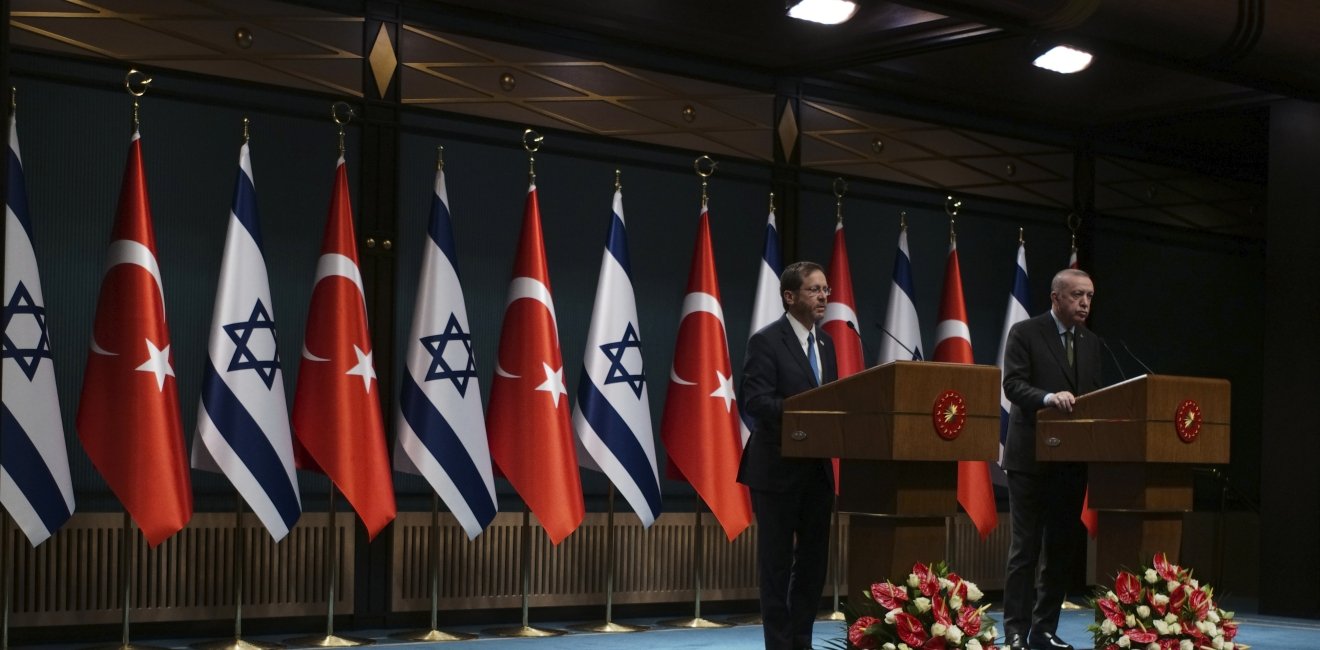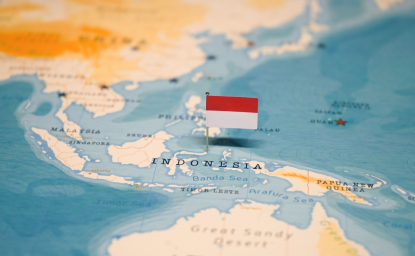As two of the three non-Arab states in the region, Turkey and Israel maintain a complex and often fluctuating relationship marked by both cooperation and tension. Turkey was the first Muslim-majority country to officially recognize Israel in 1949. From the 1950s until the 1980s, Turkey had a balanced policy that was sensitive to regional dynamics while keeping a low profile.
Maintaining diplomatic and economic ties with both Israel and its Arab neighbors was a priority for Turkey, which also recognized the Palestinian state in 1988. Though initially shaped by Israel's stance on Palestinians, mutual visits and cooperation in the early 1990s show the relationship soon evolved beyond the Arab-Israeli conflict.
Increased trade and cooperation
This era saw deep diplomatic relations with Israel and the signing of several key agreements in 1996. The Defense Cooperation and Free Trade Agreements (FTA) were pivotal in formalizing cooperation across military, diplomatic, economic, and intelligence sectors. The FTA, in particular, played a crucial role in boosting economic relations, with bilateral trade exceeding $1 billion by 2000—a significant increase from $304 million in 1994. This agreement laid the foundation for strong bilateral economic ties that have remained resilient until after October 7 despite many political crises.
In the early 2000s, tensions between Turkey and Israel began to rise. The collapse of the Israeli-Palestinian peace process, along with the outbreak of the Second Intifada, strained relations. This period also saw a shift in Turkey's internal politics with the rise of the Justice and Development Party (AKP) led by Recep Tayyip Erdoğan, whose administration initially proposed positive relations but shifted to a more assertive stance, focusing on the Palestinian cause and increasing criticism of Israel.
Turkish-Israeli relations have been tumultuous under Erdoğan since then, often mirroring the fluctuations in Israeli-Palestinian tensions. Ankara’s condemnation of the 2008-2009 Israel-Gaza conflict marked the beginning of a bleaker era, followed by the "one-minute" crisis in Davos in 2009 and the 2010 Gaza flotilla raid, leading to the deaths of nine Turkish citizens. The crisis resulted in Turkey downgrading diplomatic ties to the second secretary level and suspending military agreements.
Attempts to restore relations with an agreement in 2016 failed in December 2017 following US President Trump's recognition of Jerusalem as Israel’s capital, leading to further diplomatic fallout. Israeli Prime Minister Benjamin Netanyahu accused Erdoğan of being Hamas's biggest supporter, while Erdoğan labeled Israel an 'apartheid regime' and defended Hamas, rejecting labeling it a terrorist organization.
Despite Erdoğan’s announcements of suspending “military and commercial ties” with Israel after nearly every crisis, Turkey-Israel economic relations have significantly expanded over the past 20 years.
The personal estrangement between the two leaders seemed to drive the two nations further apart, yet their economic relationship has paradoxically strengthened. Despite Erdoğan’s announcements of suspending “military and commercial ties” with Israel after nearly every crisis, Turkey-Israel economic relations have significantly expanded over the past 20 years. According to the Turkish Statistical Institute (TÜİK), the bilateral trade volume of $1.41 billion in 2002 rose to $8.91 billion by 2022, with the trade balance consistently favoring Turkey. Arguably, for both leaders, the rhetoric is merely a façade aimed at securing domestic gains, while the expansion of economic interests takes precedence. This dynamic indicated that the Israel-Turkey relationship prioritized economic interests over political factors.
In 2022, Israel and Turkey restored full diplomatic ties and reappointed ambassadors, driven partly by Turkey's economic crisis and broader rapprochement with countries in the Middle East and North Africa region and both governments’ strategic interests in countering Iran. Despite anti-Israel rhetoric, Erdoğan’s administration recognized the strategic importance of maintaining relations with Israel, separate from its Palestinian policies.
After October 7
The October 7 attacks sparked an international crisis, further straining already fractured Turkey-Israel relations. Initially, Erdoğan projected a more restrained stance. During a speech in Ankara, he called for both Israelis and Palestinians to act with restraint. However, this relatively tempered approach lasted only for a minute. Within days, President Erdoğan escalated his rhetoric, aligning more vocally with the Palestinians while lambasting Israel's actions in Gaza as genocide and war crimes.
This shift in tone was Erdoğan’s way of balancing pragmatism with ideological alignment, particularly with groups like Hamas. Throughout his presidency, Erdoğan has worked on cultivating an image of his government as a defender of Palestinians. His short-lived temperance following October 7 quickly led to more familiar aggressive rhetoric, albeit not matched by similarly aggressive actions. Erdoğan's speeches have grown more inflammatory, labeling Israel as a terrorist state and likening its leaders to historical tyrants, while his government's actions have remained relatively controlled, exposing a disconnect between fiery rhetoric and actual policy. In other words, it was bold talk for the home crowd but a striking lack of follow-through regarding international action.
The most glaring example of this gap between words and deeds is Turkey’s trade with Israel. Despite claims that Turkey had suspended trade with Israel in protest of its actions in Gaza, investigative journalist Metin Cihan and others revealed that trade between the two countries has not fully stopped. Allegations surfaced that Erdoğan’s son engaged in trade with Israel after October 7. In reality, Turkish goods have continued to reach Israel, often under the pretext of being destined for Palestine. This revelation, while not a surprise for those who are familiar with Ankara, showed geopolitical considerations were being managed in a way that limited direct economic fallout.
Erdoğan’s government has also been cautious in its handling of domestic protests against Israel. While protests have erupted across Turkey, echoing the public’s anger towards Israel, the government has sought to maintain control over these demonstrations. Protests have been allowed under strict government oversight, reflecting a clear intent to prevent uncontrolled civil unrest that could spark broader demonstrations against the government itself—whether in response to trade relations with Israel, the economic crisis, the erosion of democracy, or other issues.
When protests have fallen outside of this controlled framework, such as when demonstrators acted independently of government-organized rallies, authorities have intervened, even arresting anti-Israel protesters. For Ankara, the protests were more about shaping an image for the international community than actually opposing Israel, highlighting Erdoğan’s approach: sustaining a pro-Palestinian position to satisfy his political base while preventing any escalation into wider unrest against his government. Similarly, Netanyahu, who is facing charges of fraud, breach of trust, and accepting bribes, staying in power was crucial, and Ankara’s Hamas-friendly actions gave the Prime Minister the space needed to hit back at Erdoğan when needed.
Inflammatory diplomacy
Ankara’s support for Hamas has been a major point of contention, with Erdoğan defending the group as a legitimate resistance movement and, after October 7, praising them as liberators while condemning Israel’s actions in Gaza as comparable to historical atrocities in the Crusades and World War II. This reflects Erdoğan’s broader ambition to position himself as a leader of the ummah, or International Muslim community, using religious and historical narratives to rally domestic and regional support.
Domestically, he has securitized Turkish politics by constructing an imagined threat of an eventual Israeli attack on Turkey, while internationally, he projected Turkey as a regional power capable of intervening in Middle Eastern conflicts, citing past actions in Libya and Nagorno-Karabakh. Though relations with Israel have not been formally downgraded, tensions rose as ambassadors were withdrawn, and Turkey’s support for South Africa’s genocide case against Israel in the International Court of Justice (ICJ) adds further strain, with uncertain long-term consequences.
Erdoğan’s ambitions are tempered by Turkey’s economic and political constraints. A full-scale regional war, especially one involving Iran and its proxies, could severely impact Turkey’s fragile economy. Despite deteriorating diplomatic relations, Erdoğan has been cautious not to completely sever economic ties with Israel, given their long-standing trade in sectors like energy, textiles, and technology. Even rising tensions the transit of Azerbaijani oil through Turkey to Israel have continued unaffected.
Israel, too, faces economic strain. More than a year into its war in Gaza, Israel is grappling with rising inflation, slowed growth, and public discontent over the high cost of living. Key sectors such as tourism and exports have been hit, while increased defense spending has added pressure to social services, fueling political divisions. These factors likely explain why both governments have hesitated to take more direct action despite their heated rhetoric.
In the aftermath of October 7, a complex interplay of ideology, pragmatism, and geopolitical strategy has taken place.
In the aftermath of October 7, a complex interplay of ideology, pragmatism, and geopolitical strategy has taken place. While Erdoğan’s rhetoric has been fiery and uncompromising, particularly in his defense of Hamas and his condemnation of Israel’s actions, the reality on the ground has been more controlled compared to what it could have been. Economic ties between the two countries, though disrupted, have not been entirely severed despite the diplomatic tension.
As the conflict evolves, the cynical balance between Erdoğan's domestic posturing and diplomacy will likely remain central to Turkey and Israel's relationship. Netanyahu’s need to maintain security cooperation while navigating complex regional dynamics mirrors Erdoğan’s tightrope walk between appeasing his domestic base and engaging in realpolitik. The future also hinges on the US elections, as a shift in Washington's foreign policy could redefine both countries' regional strategies and alliances.
The views represented in this piece are those of the authors and do not express the official position of the Wilson Center.







